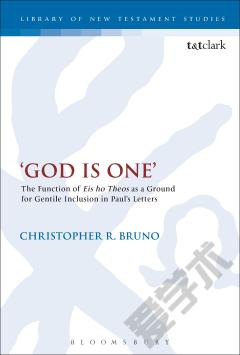'God is One' —— The Function of 'Eis ho Theos' as a Ground for Gentile Inclusion in Paul's Letters
----- 上帝是一个:作为外邦的地面保罗书信的非犹太包含物的西奥斯功能
In discussions of Paul's letters, muchattention has been devoted to statements that closely identify Christ withIsrael's God (i.e., 1 Cor 8:6). However, in Rom 3:30 and Gal 3:20, Paul usesthe phrase "God is one" to link Israel's monotheistic confession and theinclusion of the Gentiles in the people of God. Therefore, this study tracesthe OT and early Jewish backgrounds of the phrase "God is one" andtheir possible links to Gentile inclusion. Following this, Christopher Brunoexamines the two key Pauline texts that link the confession of God as one withthe inclusion of the Gentiles. Bruno observes a significant discontinuitybetween the consistent OT and Jewish interpretations of the phrase and Paul'suse of "God is one" in relation to the Gentiles. In the both the OT and earlyJewish literature, the phrase functions as a boundary marker of sorts,distinguishing the covenant people and the Gentiles. The key exception to thispattern is Zech 14:9, which anticipates the confession of God as one expandingto the nations. Similarly, in Romans and Galatians, the phrase is not aboundary marker, but rather grounds the unity of Jew and Gentile. The contextand arguments in Rom 3:30 and Gal 3:20 lead to the conclusion that Paul'smonotheism must now be understood in light of the Christ event; moreover, Zech14:9 may play a significant role in the link between Paul's eschatologicalmonotheism and his argument for the inclusion of the Gentiles in Romans andGalatians.
{{comment.content}}








 京公网安备 11010802027623号
京公网安备 11010802027623号